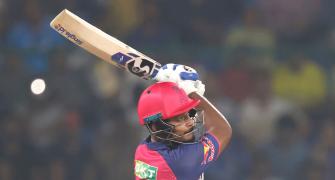Mark Tait was a winchman with the Royal Air Force on the tragic day of June 23, 1985, when Air-India flight 182 disintegrated in mid-air and he was informed of a 'head up' call from their control centre that communications had been lost with a jumbo jet over the Atlantic.
"I thought it was probably a non-event, perhaps radio or radar failure" but that proved to be Tait's wishful thinking as he and his colleagues saw gruesome scenes when they reached the area 'on scene'.
His statement was read out before Air-India Public Inquiry Commissioner Judge John Major, by the commission's lead counselor Mark J Freiman on Wednesday, third day of the hearings when they took a break from listening to family members and turned to British and Irish sailors, members of the rescue operation.
People sitting in the Victoria Hall in Ottawa, where the commission is holding its hearings, must have had a sickening experience. Tait's descriptions of what he saw and what he had to go through were quite graphic.
"The scene of the (tragedy) was a strange experience. It seems odd but I was struck by the feeling that a large number of people had just died" and the first "evidence of the passengers was an object" that Tait said he tried to recover and he became furious when he found, after all his efforts in the choppy sea, that it turned out to be a doll.
"At this time I became absolutely furious as I thought we had wasted time for this when there could be someone drowning," Tait said.
Next, he found four bodies, one of them being "a young Asian woman, approximately 25-30 years, slim, long hair, well manicured finger nails and wearing underwear and a top."
"I managed to be placed close to her (from the helicopter) and managed to grab her. I turned her over in the water. She was completely floppy and unresponsive. She had several large cuts to her person and her ankles were almost severed. She had cuts to the thighs and abdomen and I could see fatty tissue emanating from her wounds," he said.
Tait then went on to describe how he tried to recover her body by placing the strop around her: "The body was slipping through the strops and I had to physically grab hold of her so as not to lose her."
Others had "similar injuries. It was pretty bad, there was a lot of body tissue, fat and I saw various body parts. I swallowed a fair amount of sea water that had lumps in it, and I presume that this was human flesh, tissue or whatever."
Tait gave details about another body he described of an "elderly, plump Asian woman wearing a sari."
Tait was winched to her and he had a "difficult time fighting my way through the sea and her sari to get to her. She had similar injuries as others (but) she had a massive wound to her abdomen."
Tait described how he had placed the strop "over her submerged head and struggled to place it around her chest. I then rolled her body in the water so that she was face up. I then moved to her knee to place a second strop over her feet. I couldn't reach and her feet seemed to be floating further away" and after looking again ,"I found that she had effectively split into two and was only connected by her intestines, which were now becoming entangled in me and my equipment."
Tait said he wanted to "recover the body for her relatives. It was obvious this was impossible and so with difficulty I removed the strops and reluctantly watched her float away in our rotor wash, quite a haunting image and a decision that still unsettles me."
When Tait was asked again to recover more bodies, he "chose not to go and suppressed the feelings of guilt about not helping."
He was then approached by Canadian investigators to testify in British Columbia Supreme Court before Judge Ian Josephson during the trials of Ripudaman Singh Malik and Ajaib Singh Bagri.
That opened old wounds. Tait said: "I became clinically depressed. It was a pretty close thing whether I could make it through" but Tait complemented Royal Air Force for all support that he received through an eminent psychiatrist."
He was off work for 9 months, "of which I can't remember what I was doing. I put on weight and could not bear to speak to anyone other than my wife and daughter."
Tait said when he finally decided to testify in the British Columbia Supreme Court he went there with some guilty feelings where he and his other colleagues, who too were involved in the rescue operation, were asked to meet members of the victims' families.
He said he going there and meeting the families "was the best decision we could have made. It was truly humbling" and "uplifting to meet the relatives."
Tait said they were "so kind and appreciative, not just to our actions, but to our feelings as well." He called it "absolutely invaluable personally."
During that meeting with the families, Tait saw an elderly Asian woman who was sitting alone: "I talked to her, and she said that her daughter (a promising doctor) was lost, and had never had the body recovered. I said how sorry and guilty I felt that more bodies had not been recovered and she said she preferred to remember her daughter as she was rather than have the pain of seeing her broken."
"It's a shame she didn't speak better English, because I didn't think she understood how relieved and thankful I was to hear someone say that -- it really helped me, and I don't think she will ever know how much," Tait said.
In Part 2 of his statement, Tait complimented the professionalism of the Royal Canadian Mounted Police and other Canadian law enforcement agencies. Here, of course, victims' families would all disagree, but Tait, as he noted, was making his own statement without being influenced by anybody.
"In my opinion the conduct of the RCMP and the Canadian judiciary has been exemplary, superb and beyond reproach," he said.
Tait conceded in this regard "there are issues regarding the evidence."
He was affirming from his own experience "that from the first contact with the Canadian authorities I have been deeply impressed with their determination and commitment to bring the perpetrators to justice."
Concluding his statement, Tait hoped, "the guilty are brought to book."
Even the journalists were literally crying on Wednesday sitting inside the Victoria Room in Ottawa.
There could have been no one who did not become emotional listening to the statement of Mark J Stagg, who was during the June 1985 Air India tragedy, the third officer on the Laurentian Forest, a vessel, owned by the Federal Commerce of Montreal.
They got an emergency alert on June 23, 1985, and were advised to keep a sharp lookout and that was followed by "an emergency message."
And finally they discovered that there was a wreckage of the plane and that "the wreckage extended 5 or 6 nautical miles from our present position in every direction" and from the wreckage "all those on board the LF were hopeful of finding survivors."
As he started describing the recovery of bodies from the helicopter and lowering them on board the ship, details given by Stagg became really graphic and many people in the hearing room started crying. Stagg himself had to take long breaks to compose himself and drink some water so that he could continue making his statement.
"A winchman is lowered late morning. This is unusual. He is carrying something. It has usually been some wreckage. This time it's a baby. He is crying as he passes me the bundle. He leans his head to mine and shouts 'sorry' and then he's gone. I look down into the towel, he/she is perfect and beautiful," Stagg said.
"I don't know what to do next. I rested my cheek on the baby's head and it so cold. I put the baby in a plastic bag. The bag is 6 feet long and the little soul lies at the bottom and is insignificant. I feel guilty," he adds.
Addressing Judge John Major, Stagg said, "I cannot begin to describe the utter wrongness of putting children into plastic bags. The words taste foul in my mouth. I can never escape how bad I felt then and how bad I feel now."
It was that day "the boy in me died. I didn't recognise this until years later."
That's the day, Stagg said, his faith "in goodness and God and sense and normality died."
"Once the helicopter arrived on the scene I took charge of the team on the deck receiving casualties from the Sea King Helicopters on the scene," Stagg said. Among the first to be brought on board were two young boys, said Stagg.
They were "fully dressed. They seemed uninjured. It was difficult to accept that they were not merely sleeping," he added.
He explained as a merchant vessel they were not prepared "to deal with such an accident as an air crash." In some cases "the skeletal structure of these poor people was so disrupted that handling first or once in the bag was very difficult and enormously distressing.
Stagg said, "A civilian doctor was put on board their vessel "to try and determine the nature of the accident by way of the injuries suffered."
To Stagg it "was an error in judgement. As a country doctor was obviously unprepared for the scale of the event as we were. He had no equipment with him and was under considerable stress."
Stagg and another colleague, Daniel Brown, who also testified before the commission on Wednesday, "functioned as mortuary assistants in unbagging the casualties. These were not proper body bags, but basically heavy duty plastic sacks. This was hard work physically and extremely distressing, particularly when dealing with children."
We were required by the doctor "to rebag the casualties and tag and label each one giving sex, time found and the vessel's name."
Stagg and his colleagues on the Laurentian had worked several hours. "All those who are involved in the recovery work clean up, wash and change and wash and wash and wash."
The aftereffect of that, Stagg described, was getting nightmares: "When I suffered my worst dreams and flashbacks at night, I would often wake up to find myself washing."
He described the deck of the Laurentian as "There is now a lot of blood. The people have been in the bags for sometime. They have no form and look wrong. A basket stretcher is lowered -- some casualties won't make the right shape -- we put them at a time onto the stretcher."
"The sense of wrongness is massive. In the end I feel I failed them and their dignity. I will live to regret all my life," Stagg said.
Stagg said the several bodies of women they recovered were completely naked.
To him the nightmare has never ended despite his initial belief it will with time: "It never did end. It was as bad as it seemed. In fact it's worse. Your mind protects you at times, but then it gets you later."
Stagg made a special reference to Dr Padmini Turlapati, who lost both her sons in the tragedy. He and his colleague Daniel Brown found the body of one son Sanjay. "She thanked me for saving her son," Stagg said.
"It is my everlasting regret that we saved no one and yet she thanked me. I am moved beyond words by such care," Stagg added.
To Stagg, members of Air India victims' families "have a grace and dignity, in the face of such suffering. That has been both humbling and a source of renewal and restoration of my belief in humanity."
Stagg is currently head of Training and Development for the Maritime and Coastguard Agency in the United Kingdom.
He clarified to the commission it was his personal statement and not the official opinion of his employer.








